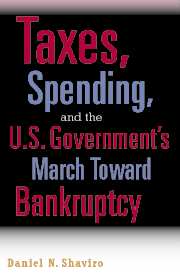Book contents
- Frontmatter
- Contents
- Acknowledgments
- Part 1 Labels and Consequences: The Failure of Our Fiscal Language
- Part 2 The Why and How of Long-Term Budgeting
- 4 What Are We Talking about When We Talk about Budget Deficits?
- 5 Long-Term Measures in Lieu of the Budget Deficit
- 6 Fiscal Gap Politics
- Part 3 Labels and Policies across Budget Categories
- Part 4 Conclusion
- Notes
- Bibliography
- Index
6 - Fiscal Gap Politics
Published online by Cambridge University Press: 18 December 2009
- Frontmatter
- Contents
- Acknowledgments
- Part 1 Labels and Consequences: The Failure of Our Fiscal Language
- Part 2 The Why and How of Long-Term Budgeting
- 4 What Are We Talking about When We Talk about Budget Deficits?
- 5 Long-Term Measures in Lieu of the Budget Deficit
- 6 Fiscal Gap Politics
- Part 3 Labels and Policies across Budget Categories
- Part 4 Conclusion
- Notes
- Bibliography
- Index
Summary
Buzz: We're going to have us some real kicks. Little chickie-run. You been on chickie-runs before?
Jim: Sure – that's all I ever do.
– From Rebel Without a CauseLess! Bread! More! Taxes!
– Crowd in Lewis Carroll, Sylvie and BrunoMr. President, I'm not saying we wouldn't get our hair mussed. But I do say … no more than ten to twenty million killed, tops. Uh … depending on the breaks.
– General Turgidson, in Stanley Kubrick's Doctor StrangeloveThere can be no serious doubt that our current budgetary policy path places us at needless risk of a major fiscal meltdown. It remains unclear, however, whether such a “hard landing” is more likely or less likely than a scenario in which revenues and outlays adjust sooner and more gradually. This is in large part a question about our political system and its capacity to yield mature and responsible policy decisions.
To understand the politics of narrowing the fiscal gap, a lot more is needed than just denunciation of the last few years of federal budgetary policy. I see the needed analysis as having five stages. First, what were the politics of creating the fiscal gap? Second, what led to the political consensus from 1982 through 2000 that favored deficit reduction and thus – however imperfectly, given the flaws in the measure – a narrowing of the fiscal gap? Third, why did that consensus collapse?
- Type
- Chapter
- Information
- Publisher: Cambridge University PressPrint publication year: 2006



